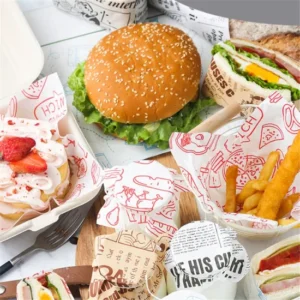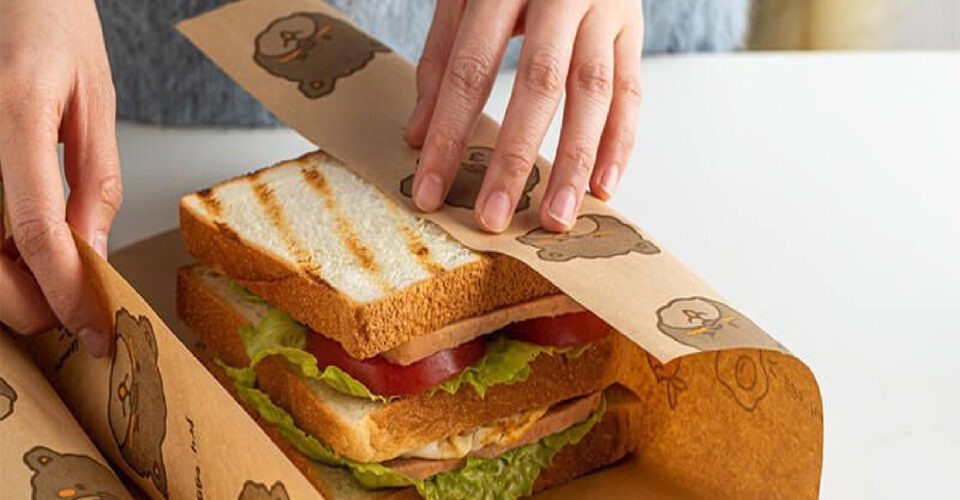No culinary operation can underestimate the vital role that food wrapping paper plays in their practices. Restaurant owners and deli managers alongside home cooks should carefully choose their food wrapping paper because it determines food quality and hygiene and presentation results. The numerous types of food wrapping paper gain distinction through deli paper because of its flexible functionality. The following text investigates deli paper’s detailed characteristics together with its advantages as well as multiple applications within USA food services sector.
What is Deli Paper?
Food establishments typically use deli paper to package their sandwiches and burgers as well as their other range of deli products. The paper provides dual protection by being both resistant to moisture and greasy substances in order to keep food fresh and attractive for presentation. Food manufacturers produce this paper by combining virgin fibers which either go through bleach treatment or not with various weight options suitable for packaging different food types.
Characteristics of Deli Paper
Grease Resistance: The main strength of deli paper comes from its effective grease resistance capabilities. The substance provides exceptional resistance against moisture which makes it appropriate for protecting fatty and oily food products like deep-fried items and saucy sandwich fillings. Repeated exposure of food to grease is blocked by deli paper which maintains exterior cleanliness and attractive appearance for both customers and staff.
Moisture Resistance: Manufacturers purposefully made deli paper to support moisture content without damaging its material framework. The special design of deli paper perfectly suits foods that contain wet ingredients such as tomatoes and pickles and sauce. The paper remains dry through moisture resistance thus avoiding unsatisfactory eating experiences from sogginess. 
Breathability: Beneath a deli paper shield food retains exposure to air due to its ability to let air flow through while providing defense against moisture and contaminants. Cured meats together with cheeses require specific air exposure to maintain their flavor quality while preserving their texture structure.
Food Safety: The Food and Drug Administration allows deli paper treatment that enables safe food contact. Safety standards must be met by food wrapping paper utilized in food service establishments to avoid product contamination. The Federal Drug Administration has approved deli paper for food packaging applications thus establishing it as a dependable packaging solution.
Uses of Deli Paper Deli paper serves multiple venues that include both commercial eating places and independent culinary operations and private eating ventures. Below we present various typical usages of deli paper in the market.
Sandwich Wrapping
The principal usage of deli paper exists in the practice of sandwich wrapping. The maintaining properties of deli paper help keep sandwiches both fresh and intact before serving time for deli sandwiches as well as gourmet creations. The grease-resistant feature maintains the outer surface clean allowing customers to sustain their meals efficiently while avoiding hand messes.
Cheese and Charcuterie Boards
Flat sheets of deli paper serve as a standard wrapping material for both cheese and charcuterie service. Deli paper serves as a separating material between multiple cheese and cured meat items to create presentable arrangements without sacrificing elegance. Paper breathability permits cheese items to release trapped gases and improves their taste without causing moisture accumulation.
Portion Control
Foods service providers extensively use deli paper as a method to control portion sizes. Deli paper serves as an essential tool for measuring appropriate serving sizes because it maintains both hygiene and presentation quality for salads, sides and desserts. Food service providers especially utilize deli paper in catering and buffet operations.
Takeout Containers
Restaurants worldwide depend on deli paper as a vital component for delivering convenient takeout dining services to their customers. Restaurants achieve meal transport success when they use deli paper to wrap food pieces then put them in takeout boxes or bags for protection against spoilage and damage. The careful packaging of food with this method makes the entire dining experience more enjoyable since customers appreciate the thought that goes into the presentation.
Benefits of Using Deli Paper
The specific benefits obtained from deli paper usage in food wrapping extend to both retail businesses and their purchasing clientele. Here are some key benefits:
Cost-Effective
The price of deli paper remains lower than the prices of standard packaging materials consisting of plastic and aluminum foil. The utilization of deli paper enables businesses to cut their packaging expenses without compromising the quality of their food products.
Eco-Friendly Options
The rising environmental awareness has led suppliers to produce sustainable deli paper by using renewable recycled and sustainable natural fibers. Businesses receive two key benefits by selecting environment-friendly packaging options since they win both customers focused on sustainability and lower their costs because deli paper remains affordable.
Versatility
Deli paper works effectively with multiple food items so different types of establishments have the opportunity to use it. Its dual functionality makes deli paper suitable for multiple applications which decreases requirements for various types of packaging resources.
Enhances Presentation
The application of deli paper produces an attractive visual presentation of food products. The neat delineated look of deli paper gives professional flair to wrapped sandwiches along with takeout meals. Printed deli paper enables businesses to show brand logo designs that not only advertise their business but also help to make food packages more visually appealing.
Easy to Use
Staff personnel find deli paper easy to handle which allows them to package food items rapidly without complications. The ability to work efficiently in crowded food service locations such as delis or food trucks provides this wrapping solution with an advantage. Related Article: Food Wrapping Paper Types, Benefits & Eco-Friendly Alternatives
Conclusion
The culinary industry heavily depends on food wrapping paper which deli paper stands as one of the best versatile solutions for this task. Its moisture-defying qualities combined with breathability allow deli paper to be an optimal solution for wrapping both sandwiches and burgers and other foods in deli counters. The advantages of deli paper combined with cost-savings and environmental friendliness along with improved presentation make this food service material highly valuable.
Any operator in the food industry from home cooks to restaurant owners needs to grasp the fundamental value of food wrapping paper especially deli paper for successful food preparation and presentation. Food industry evolution progresses while deli paper continues acting as a staple solution for maintaining food quality together with satisfied customers throughout the industry.








